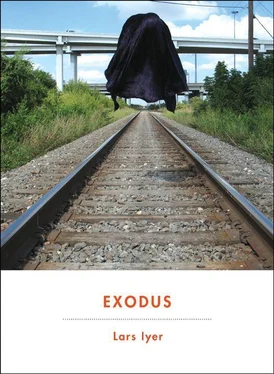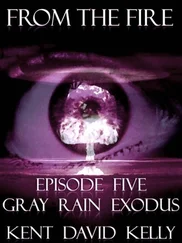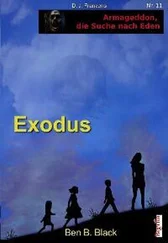Still heading south.
He can see my lips moving as I read, W. says. It’s not a good sign in a scholar. And I read too quickly ! I read like a maniac!
You have to linger over the page, W. says. You have to annotate as you read. Write notes!
I have no real idea how to read, W. says. No idea how to approach the oeuvre of a great thinker, head on, as he does, reading the primary text in the original, line by line, looking up difficult words in a dictionary. I have no sense that I should come at an oeuvre from upstream , as it were, gaining a knowledge of the tradition of which it is a part, of the thinkers that influenced its author. I have no awareness of the importance of context , of the centrality of history .
I rely on secondary commentaries, on idiot’s guides, W. says. In the end, I am only a ransacker of books, a kind of reader-marauder. My reading is a great pillaging, as if by a Viking raiding party.
This has to be our last lecture tour, W. says. This has to be the last time, the last dog and pony show. Why do we bother? What do we have to say to others? To teach ?
W. feels the hatred of past generations, he says. Of our ancestors who thought something good might come out of their struggles. Of our forebears who lived and died in the hope that life in this world might be bettered. We’ve betrayed them! W. says. We’ve stamped on their dreams!
And W. feels the hatred of our descendants, of the ones who are not yet born. We’ve stolen their hope, W. says. The very grounds of their hope. We’ve stolen their world ! He hears their cries, W. says. He hears their wailing. They’re not yet born; they’ve yet to appear on their scorched and burning earth: but he can feel their hatred even now.
W. wants to see how it all ends, he says. He wants to see how it will all turn out. But this is how it ends: him on a train, travelling with an idiot. This is how it will all turn out …
‘ The true and only virtue is to hate ourselves ’, W. says, reading from his notebook. To hate ourselves: what a task! He’ll begin with me, W. says. With hating me. Then he’ll move on to hating what I’ve made him become. What I’ve been responsible for. Then — the last step — he will have to hate himself without reference to me at all.
This step, for him, will be the most difficult. He can hardly remember what he was like without me! He has no idea what he might have been, what he might have achieved. I arrived too early in his life. The blow was fatal.
It’s a relief, of course, W. says. He can blame me for everything. It’s all my fault, his failure, his inability to think! In fact, that’s probably why he hangs out with me, W. says: to have a living excuse for his failure, his inability to think.
The Thames Valley. Villas on the hillside. Barges on the river. Stations flashing by.
W. fell into a four-week depression when he received his letter of redundancy, he says. Day after day, he stared out of the window, like the guy in the opening scene of Tarr’s Damnation . The contingency of it all! His manager had put his name forward to be sacked. That was it. The cursor had blinked over his name. And he received his letter: ‘ We’d like to take this opportunity to thank you for your years of service …’ But it might have happened otherwise. His manager might have selected someone else for redundancy. The cursor might have blinked over a name other than his.
We live insignificant lives, W. says. We live like ants. Like cockroaches. He’d give anything to believe in fate , like the ancient Greeks, W. says. Or to believe that God willed our sufferings. That our sufferings matter: that’s what Kierkegaard thought, isn’t it? W. says. He remembers the line from Kierkegaard that he copied into his notebook: ‘ Suffering teaches us the great lesson of dying to the world, and to worldiness ’.
Does the contingency of my suffering bother me ? W. wonders. He knows about my years of un employment and under employment, W. says. He knows I’ve lived my life in a succession of rooms, each more squalid than the last. He knows I’ve lived my life beneath the pavement .
But W. wonders whether I ever really experienced my despair, he says. I’ve never grasped my despair in its philosophical dimension, W. says. In its political dimension. I’ve never asked myself about the conditions of my despair, W. says. About the forces that constitute it. I’ve never asked myself about the whole , the totality , the order of things . I’ve never railed against the haphazard nature of my despair. The fact that things could have been otherwise .
He’d like to think that our despair calls us, W. says. That it singles us out . That despair is like a beacon shining upon us, calling us to a new destiny. That despair, in some sense, is like the voice of God , summoning us to our vocation. Here I am : that was Moses’s response, when God spoke to him from the burning bush. Here I am, who would pledge himself in service to you.
And God told Moses that He knew of the pain of his people. That He knew of their tribulations, and had heard their outcry. — ‘ And I have come down to rescue you from the land of Egypt and to bring you up to a good and spacious land, to a land flowing with milk and honey ’.
Moses’ despair gave way to a divinely appointed task, W. says. Despair blossomed into hope. Will the same thing happen to us? W. wonders. Will our despair blossom into hope? Are we heading to the land of milk and honey?
I knew Reading would appal him, I tell W. The town itself is just like any other town, the usual shops, the usual new developments along the river. Except that it’s more like any other town than any other town. And here in the suburbs, the extent of its horror becomes very clear.
Blank-box executive homes, five to a plot. ’70s semis with barn-sized extensions. Driveways packed with Land Rovers and 4×4s … Mock Tudor houses … Mock Georgian ones, with pebbledash rendering and plastic windows. Labyrinthine estates with roads named after flowers, after colours, after days of the week. Minor roads, thick with cars. Cars and car-parks and front gardens tarmacked over and covered in cars …
There are older streets, too, with great canopying trees. Villas subdivided into flats. Victorian houses with pattern-tiled paths and iron railings. The sun flashing on conservatory glass. And private schools, with their girls in boaters, with their boys in caps and blazers, and mothers at their gates in sparkling jeeps. W. is overwhelmed by class hatred, he says. He recites the names of Marxist revolutionaries to calm himself down …
The Reading yuppies are raising their young to be more rapacious than they are, W. says. More grasping than they are. They’re treating them to babyccinos in chi-chi cafés. They’re sending them to the best schools. And one day, they’ll get work experience and internships for them. One day, the children will find work in the corporations of Reading, and the children will start their careers in the suburbs of Reading. And the whole cycle will begin again …
Only the capitalism-hardened can survive here, W. says. Only self-marketers and self-advertisers. Only those who perform PR for their own souls …
As for everyone else?: Suicide! W. says. Exile! Despair! Terrible depressions! Derangements of the spirit! Half of the Reading young are starving themselves in darkness, W. says. Half of them are slicing up their arms in secret. Half of them think of death and only death. Half of them pray for the apocalypse.
Читать дальше












